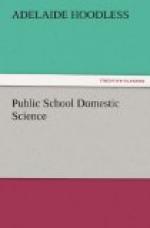The habit of chewing gum cannot be too strongly condemned, both for the reason given in the preceding sentence and for its effect upon the muscles and nerves. It is being more and more realized by the public in general, that the breaking down of health at school is more often due to impoverished nutrition than to overwork. Delicate children should not be allowed too long intervals between meals, as for instance, the evening meal at six o’clock and breakfast the following morning at seven or half past. A glass of milk and a piece of whole wheat bread and butter should be given—if they awaken—during the night. Delicate children whose appetites are poor, and who do not do proper justice to their regular meals, should be given an extra allowance of hot broth or hot milk with bread and butter, between meals.
These rules are applicable in cases of children who, during one or two years, seem to develop with extraordinary rapidity, growing sometimes two inches or more in six months. The demands of this rapid growth must be met by proper nutrition, or serious subsequent impairment of vitality may result. Such children should have their meals made tempting by good cooking and pleasant variety, as well as an agreeable appearance of the food. Meat which is carved in unsightly masses and vegetables which are sodden and tasteless will be refused, and an ill attempt is made to supply the deficiency in proper food by eating indigestible candy, nuts, etc. Children often have no natural liking for meat, and prefer puddings, pastry or sweets when they can obtain them; it is therefore more important that meat and other wholesome foods should be made attractive to them at the age when they need it.
* * * * *
SUGGESTIONS FOR SCHOOL CHILDREN’S DIET.
If early rising is insisted upon, a child should never be set at any task before breakfast, especially in winter; and if it is not expedient to serve a full breakfast at half-past six or seven, the child should be given a bowl of milk and bread, a cup of cocoa with a roll or other light food. Breakfast may be served later, after the first exercises of the morning, and should consist of porridge of wheaten grits, hominy, fish, eggs, fruit (raw or cooked), bread and butter. Dinner, which should always be served near the middle of the day, should comprise meat, potatoes, one or two green vegetables, some form of light pudding or sweet. Supper, it is generally admitted, should comprise easily digested articles of food; such substances as pastry, cheese and meats are better omitted; it should consist of a porridge, with milk or cream, or a light, farinacious pudding of rice, tapioca or sago, with bread and butter, and some simple form of preserve, stewed apples or prunes, or very light, plain cake. A good bowl of nutritious broth—or soup—with bread or crackers, may be substituted for the porridge or pudding. It will sometimes be found best to serve this meal at seven or half-past seven o’clock; in this case the child should be given a slice of bread and butter or a glass of milk (drinking it slowly), at half-past four or five.




